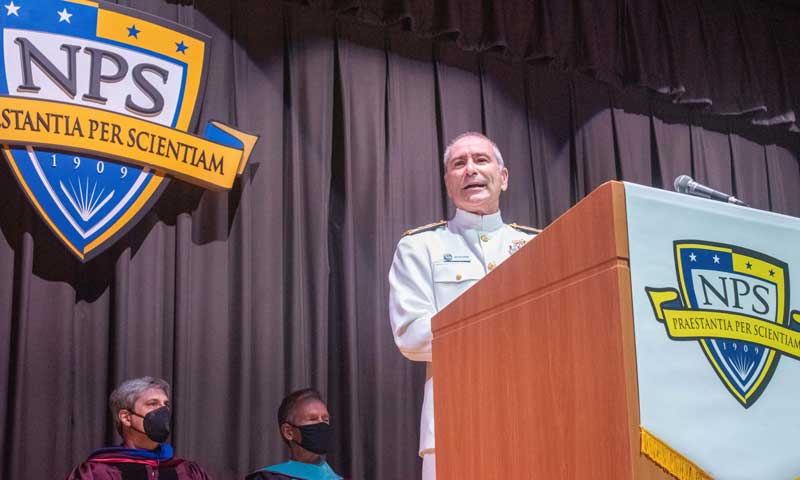For just the second time in 2021, the Naval Postgraduate School (NPS) celebrated a graduating class in person during a hybrid ceremony for its Summer Quarter graduates, Sept. 24 in King Auditorium, honoring and recognizing the remarkable achievements and resiliency of the class. While these students completed the same rigorous programs and research requirements as other graduates, they did this by adapting and overcoming the adversity brought on by the COVID environment.
Commencement speaker and NPS alumnus, Commander, Naval Surface Forces/Commander, Naval Surface Force, U.S. Pacific Fleet Vice Adm. Roy Kitchener, known around the Navy as the Surface Warfare Officer Boss, or “SWO Boss,” congratulated the 294 graduates, including 23 international students from five countries, conveying how the nation’s warfighting ability is directly correlated to their NPS education.
“This institution and our military’s technological advancement are completely linked,” said Kitchener. “For more than a century, the Naval Postgraduate School provided students with top-of-the-line, defense-focused education, and this year marks 70 years of providing that service from Monterey.
“The Naval Postgraduate School has long recognized the connection between technology and warfighters – people drive technology, and then technology improves our human ability, and neither can accomplish the mission purely on its own,” he continued. “In today’s rapidly evolving battlespace, it is crucial that as leaders, you grasp and fervently apply the full potential of our systems – and you learn that here at NPS.”
U.S. Navy Surface Warfare Officer Lt. Jonathan Shepherd is the embodiment of Kitchener’s remarks about warfighters driving technology. Shepherd came to NPS with operational experience in mine countermeasures and the AEGIS weapons system. He conducted his thesis research at the classified level pioneering the latest technology used by the fleet to protect ships from incoming missiles. For his work, Shepherd is the recipient of both the Military Operations Research Society (MORS) Tisdale Award and the Surface Navy Association Award for Excellence.
“I did my thesis research on the SPY-6 radar, the newest and most sophisticated Integrated Air and Missile Defense sensor in the fleet,” said Shepherd. “Since the 1980s, Navy radar evolution has been constrained by the technology of their time. My research helps accurately and precisely quantify what factors affect new radar performance with the objective of enabling commanders and commanding officers the ability to accurately employ this new fleet capability against sophisticated threats to the Navy.”
As an NPS Meyer Scholar, a program devoted to solving the real-world challenges of air and missile defense, Shepherd says there is nothing like NPS when it comes to conducting the research he pioneered.
At NPS, we have something that very few universities have, classified research capabilities, said Shepherd.
“All the experts that I got to work with and learn from all while in a secret space has been an experience like no other,” he said. “This is a place that is unique and there’s no other place that I could’ve conducted this research.”
NPS President retired Vice Adm. Ann E. Rondeau encouraged the students to be ready to face whatever challenges lay ahead.
“Armed with what you now know and the leaders you all are; you are ready,” said Rondeau. “Uncertainty is certain, so trust in what you have truly learned and in who you are as leaders. While your degree and research accomplishments are real and tangible, knowable and measurable, they are but stepping stones to address the unknown and complex challenges ahead.
“The most common refrain I hear from an NPS graduate is, ‘NPS taught me how to think,’” she continued. “I say, NPS has taught you how to think, better,” she stressed.
“In other words, your NPS experience has equipped you with advanced critical, analytical, methodical and scientific-based thinking capabilities to not only excel in your warfighting disciplines, but to present your senior leaders with reasoned options when they have to make hard choices. Trust in this as you navigate an uncertain future as competent and confident, determined leaders,” she said.
As Kitchener continued his remarks, he invoked a 1959 NPS commencement address delivered by former Chief of Naval Operations Adm. Arleigh Burke, who said, “Rapid technological advance… did not come by accident, nor did it come overnight. It has been the result of educating carefully selected officers in each succeeding generation.”
“You represent those carefully selected officers,” Kitchener noted to the graduates.
In closing, he asked three things of the graduates as they transition to their new assignments in the Fleet and Force.
“First, be bold. Let your questioning spirit stoke the flames of rapid change. And be convicted in bringing the right ideas to fruition. Second, have a can-do attitude, tempered by your understanding of risk. Approach innovation with realism and tangible outcomes – address faults head on and continue to find long-lasting solutions for them.
“And finally, be demanding of leadership and stay focused on winning – that is our imperative.”
To learn more about the Summer Quarter class, check out the official NPS graduation website.


